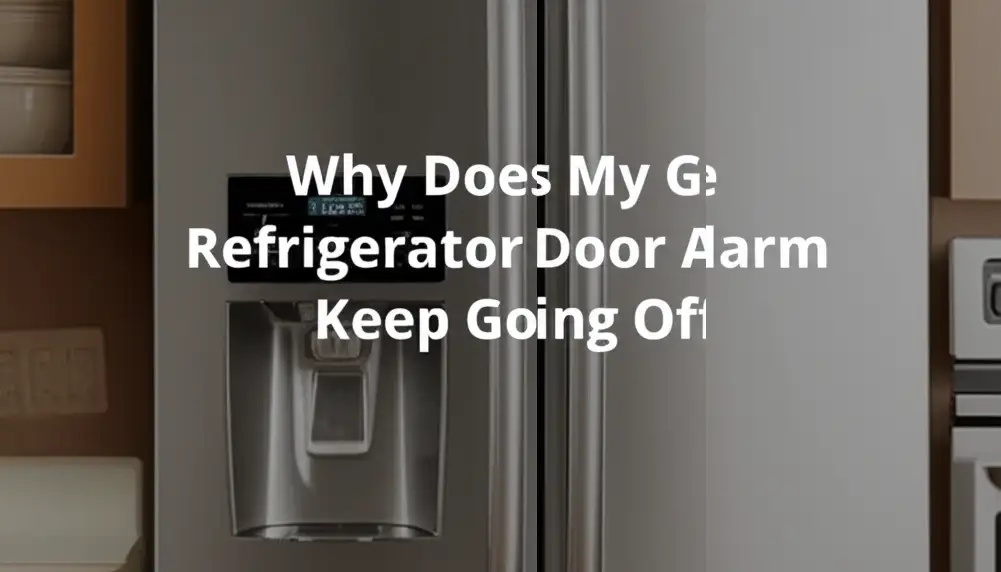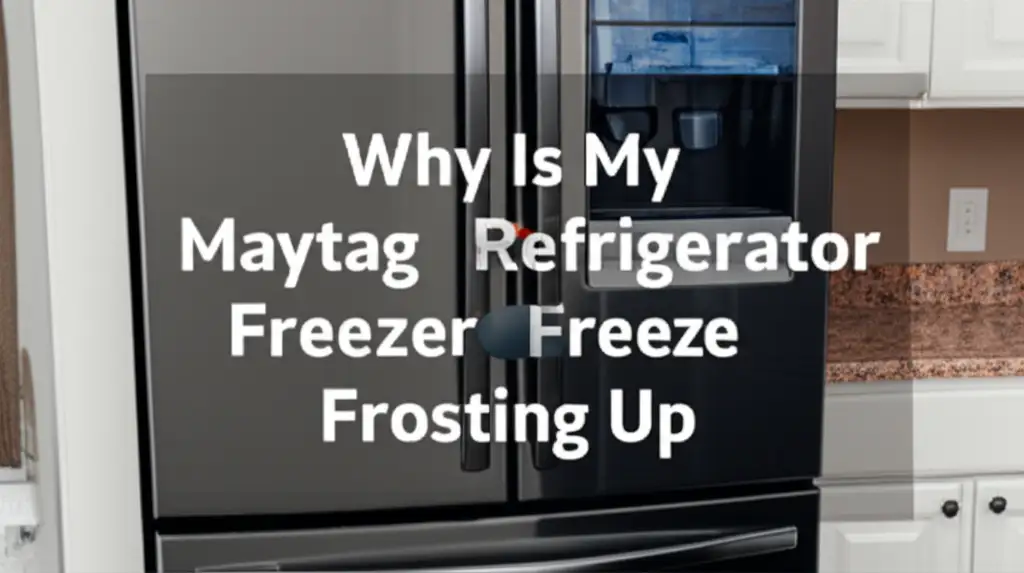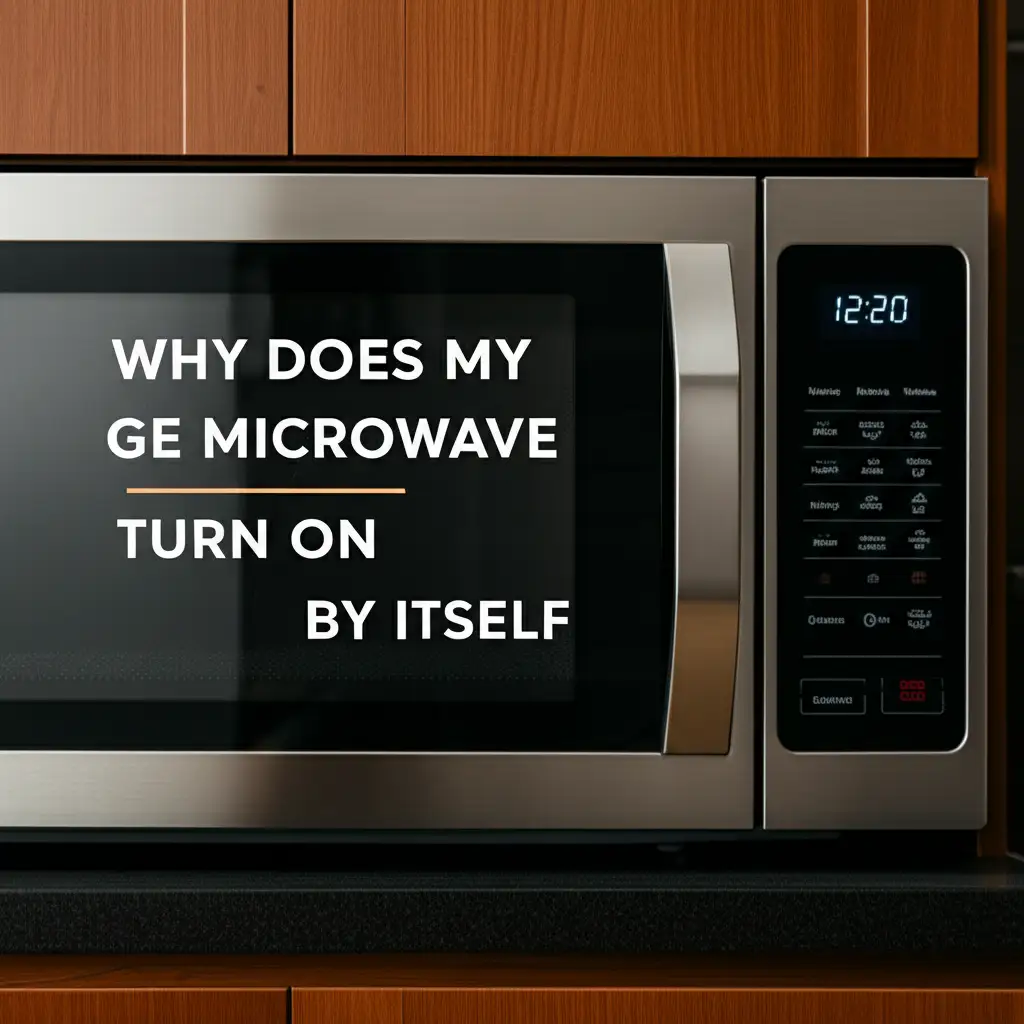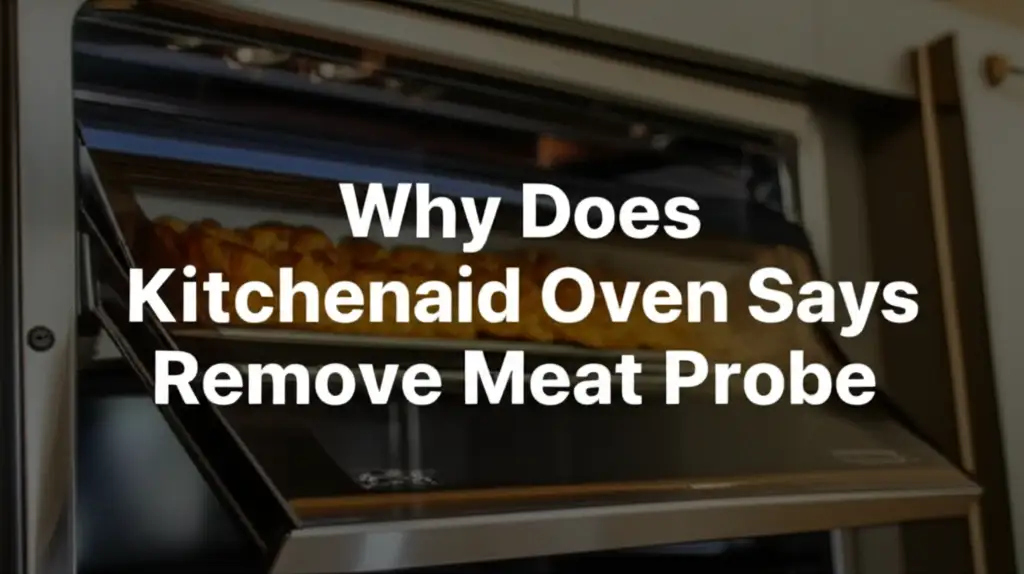· Todd Martin · Appliance Troubleshooting · 13 min read
Why Does My Ge Refrigerator Door Alarm Keep Going Off

Silence That Persistent GE Refrigerator Door Alarm
Has your GE refrigerator door alarm started beeping without a clear reason? This common issue can disrupt your home’s peace. A persistent refrigerator alarm indicates a problem needing attention. It often signals that a door is open, or the internal temperature is too high. I understand how frustrating it is when your GE refrigerator door alarm keeps going off. Let me help you find the source of the problem. This guide will walk you through various diagnostic steps. We will cover simple checks, common mechanical issues, and advanced electrical problems. You will learn how to troubleshoot and fix your GE refrigerator.
Takeaway:
- Check door closure and contents first.
- Inspect door gaskets for damage or dirt.
- Verify proper door alignment and hinge function.
- Test the door switch sensor for proper operation.
- Consider advanced issues like control board problems if simple fixes fail.
- Clean refrigerator thoroughly to prevent issues.
Your GE refrigerator door alarm keeps going off mainly due to an open door, a faulty door seal, a malfunctioning door switch sensor, or an internal temperature problem. Addressing these areas step-by-step helps identify the exact cause and silence the alarm.
Understanding Your GE Refrigerator Door Alarm System
Every modern GE refrigerator includes a door alarm system. This system prevents food spoilage. It also saves energy by alerting you when a door stays open too long. The alarm typically activates after a set period, like 60 seconds. It works by monitoring door switches located near the door hinges or frame. These switches tell the refrigerator’s control board if the door is open or closed.
The alarm system also monitors internal temperatures. If a door stays open, the temperature inside rises. The refrigerator detects this temperature change. It may then trigger a temperature-related alert. This alert is often integrated with the door alarm. My GE refrigerator once alarmed because a jar prevented the freezer door from closing fully. It was a simple fix, but the persistent beeping got my attention immediately. Understanding how this system works helps in troubleshooting. Knowing the common triggers makes diagnosing problems easier.
Common Causes of a Persistent GE Refrigerator Door Alarm
When your GE refrigerator door alarm keeps going off, several common issues are often at fault. These problems range from simple user errors to minor component failures. I always start with the easiest checks. Sometimes, the solution is right in front of you. Overlooking these simple things can lead to unnecessary frustration. Identifying the true cause saves time and effort.
One frequent cause is an obstruction preventing the door from fully closing. This could be a food item, a box, or even a drawer that is not pushed in all the way. Another common problem involves the door gasket. The gasket is the rubber seal around the door edge. If it is dirty, torn, or misaligned, it cannot create a proper seal. This allows warm air to enter, triggering the alarm. Door alignment issues or worn hinges can also cause problems. A door that does not hang straight will not close properly. Finally, a faulty door switch sensor can send incorrect signals to the control board. It might report the door as open even when it is firmly shut.
Simple Checks: Is Your GE Refrigerator Door Truly Closed?
Before diving into complex repairs, always perform some basic checks. Many times, the reason your GE refrigerator door alarm keeps going off is very simple. I once spent an hour trying to figure out an alarm, only to find a bag of groceries blocking the freezer drawer. It made me feel a bit silly, but it was an easy fix. Start with visual inspection and physical checks.
First, open and close both the refrigerator and freezer doors. Listen for a solid thud, indicating a complete closure. Look closely at the edges of the doors. Ensure no food containers, bottles, or shelves protrude. These items often snag on the door frame or other shelves. Next, check the internal drawers and bins. Make sure they are pushed back fully. Sometimes, a slightly open deli drawer can prevent the main door from sealing.
Consider the contents of your refrigerator. If it is overly full, items can shift. They might then block the door’s path. Try rearranging some items, especially taller bottles or bulky packages. Ensure items on door shelves are secure and do not lean out. Sometimes, the simplest solution is the best one.
Inspecting and Maintaining Your GE Refrigerator’s Door Seals
The door gasket, or seal, is a critical component for your refrigerator’s performance. It creates an airtight barrier, keeping cold air in and warm air out. If your GE refrigerator door alarm keeps going off, a faulty seal is a common culprit. Over time, these rubber seals can become dirty, stiff, cracked, or loose. A damaged seal lets in warm air, raising the internal temperature. This temperature change triggers the door alarm, even if the door appears closed.
To check your door seals, run your hand along the entire perimeter of both doors. Feel for any gaps where cold air escapes. Look for visible tears, cracks, or signs of wear. You can also perform a “paper test.” Place a dollar bill or a piece of paper between the door and the frame. Close the door firmly. Try to pull the paper out. If it slides out easily, the seal is weak at that spot. Repeat this test around the entire door.
Cleaning the door gaskets regularly is essential for maintenance. Use a soft cloth with warm water and mild soap. Wipe down the entire seal, removing any food particles or grime. Dirty seals cannot grip properly. After cleaning, apply a thin coat of petroleum jelly or a silicone lubricant. This keeps the rubber flexible and helps it seal better. Proper gasket maintenance ensures your GE refrigerator door alarm functions correctly and prolongs the life of your appliance. Regular cleaning also helps maintain optimal cooling efficiency. For more general cleaning tips, consider how to clean the refrigerator effectively. A clean appliance runs better.
Addressing Door Alignment and Hinge Issues
A misaligned door or worn-out hinges can prevent your GE refrigerator door from sealing properly. This directly leads to the door alarm constantly activating. The door needs to sit perfectly square in its frame to create a tight seal. Over time, refrigerator doors can sag or become crooked. This happens due to heavy items on the door shelves or general wear and tear. A misaligned door creates a gap, allowing air to escape. This temperature change signals the alarm.
First, check the door’s alignment visually. Stand back and look at both the refrigerator and freezer doors. Do they appear straight? Is there an even gap around all sides of the door when it is closed? Pay attention to the top, bottom, and sides. Next, open the doors fully and inspect the hinges. Look for any signs of rust, damage, or looseness. Wobbly hinges indicate a problem. Sometimes, simply tightening the hinge screws can resolve alignment issues. Use a screwdriver to gently tighten any loose screws. Be careful not to overtighten.
If tightening screws does not help, the hinges might be bent or worn. Some GE refrigerator models allow for door leveling adjustments. These adjustments usually involve screws at the bottom hinge or beneath the refrigerator. Consult your owner’s manual for specific instructions on how to adjust your model’s door alignment. Proper door alignment is key to silencing that nagging GE refrigerator door alarm. It also helps your appliance run more efficiently. If you ever need to work with door handles, learning how to tighten GE refrigerator door handles without visible screws can also be helpful.
Troubleshooting the GE Refrigerator Door Switch Sensor
The door switch sensor is a small but vital component in your GE refrigerator’s alarm system. This sensor tells the refrigerator’s control board whether the door is open or closed. If this sensor malfunctions, your GE refrigerator door alarm keeps going off. It might falsely report an open door, even when it is firmly shut. These sensors are typically located near the door frame or inside the refrigerator compartment. You often find them where the door meets the frame.
To check the door switch sensor, first locate it. It usually looks like a small button or a plunger that gets pressed in when the door closes. With the door open, gently press the switch manually. Listen for a click or observe if the interior light turns off. If the light does not turn off, or you do not hear a click, the switch may be faulty. Sometimes, the switch can become sticky or covered in grime, preventing it from fully engaging. Clean around the switch with a damp cloth.
If cleaning does not help, the switch itself might be broken. A broken switch sends a constant “open” signal to the control board. Replacing a faulty door switch is a common repair. This task often requires disconnecting the power to the refrigerator. You might need basic tools like a screwdriver. Always refer to your GE refrigerator’s service manual for specific instructions on how to access and replace the door switch for your model. A correctly functioning door switch is essential for silencing the alarm.
Advanced Issues: Control Board and Temperature Alarms
Sometimes, the problem causing your GE refrigerator door alarm to keep going off goes beyond simple mechanical issues. If you have checked everything from door seals to sensors, the issue might lie with the refrigerator’s internal electronics. The control board is the “brain” of your refrigerator. It manages all functions, including the door alarm system. A faulty control board can send incorrect signals or misinterpret data from the door sensors. This leads to persistent, false alarms.
A control board problem might manifest as erratic behavior. The alarm could sound even when the door has been closed for a long time. It might also show other symptoms like inconsistent cooling or display errors. Diagnosing a faulty control board often requires a multimeter and a good understanding of electrical circuits. This is typically a job for a qualified appliance technician. Replacing a control board is complex and can be costly.
In some cases, the door alarm is a secondary symptom of a more significant temperature issue. If the refrigerator’s internal temperature rises significantly due to a cooling problem, the alarm might activate. This serves as a warning that food could be spoiling. Issues like a blocked condenser coil or a failing compressor can cause temperature fluctuations. For instance, if your GE refrigerator is not cooling but the freezer is working, this indicates a larger system problem. Checking if your refrigerator is properly ventilating and cleaning under the refrigerator can help with cooling. If you suspect a temperature-related alarm, check the refrigerator’s temperature display. Ensure it matches the recommended settings. If the temperature is too high, addressing the underlying cooling issue will resolve the alarm.
When to Call a Professional for Your GE Refrigerator Alarm
You have tried all the troubleshooting steps. You checked the doors, seals, hinges, and sensors. Yet, your GE refrigerator door alarm keeps going off. At this point, it is wise to consider calling a professional appliance repair technician. Some problems require specialized tools, knowledge, and experience. Attempting complex electrical repairs yourself can be dangerous. It might also cause further damage to your expensive appliance.
Here are scenarios where professional help is recommended:
- Persistent Alarms After Basic Checks: If you fixed obvious issues but the alarm continues.
- Control Board Suspicions: If you suspect the main control board is faulty. This part requires careful handling and specific diagnostic tools.
- Internal Cooling Problems: If the alarm is related to high internal temperatures. This could point to issues with the compressor, evaporator fan, or refrigerant system. These repairs are intricate. They need a certified technician.
- Electrical Issues: Any signs of burning smells, sparks, or erratic electrical behavior. Do not attempt to fix these yourself.
- Lack of Tools or Expertise: If you do not feel comfortable working with appliance components. Professional technicians have the right tools and training.
A qualified technician can accurately diagnose complex problems. They can access specialized parts and perform repairs safely. They can also ensure your GE refrigerator runs efficiently. Investing in professional repair can prevent larger, more expensive problems down the line. It gives you peace of mind.
FAQ Section
Q1: How do I reset the door alarm on my GE refrigerator?
Most GE refrigerators do not have a manual “reset” button for the door alarm. The alarm should automatically stop once the door is properly closed and the issue is resolved. If the alarm persists after closing the door, it indicates an underlying problem with the door seal, switch, or internal temperature. You can try unplugging the refrigerator for 5-10 minutes. Then, plug it back in. This performs a hard reset, which might clear minor electronic glitches.
Q2: Can a dirty door seal cause the GE refrigerator door alarm to go off?
Yes, absolutely. A dirty, sticky, or damaged door seal is a very common cause for the GE refrigerator door alarm to keep going off. Grime and food particles prevent the rubber gasket from creating a tight seal against the refrigerator frame. This allows warm air to leak in. The temperature change then triggers the alarm. Regularly cleaning your door seals with mild soap and water can prevent this issue.
Q3: What should I do if my GE refrigerator light stays on when the door is closed?
If your GE refrigerator light stays on with the door closed, it means the door switch sensor is likely not working correctly. The light should turn off when the switch is pressed in. A faulty switch sends a constant “door open” signal to the refrigerator’s system. This will trigger the door alarm. You can try cleaning the switch area. If that fails, the switch itself may need replacement.
Q4: How long does a GE refrigerator door alarm typically sound before shutting off?
The duration for a GE refrigerator door alarm varies by model, but it commonly sounds for 60 to 120 seconds if the door remains open. Some models might sound the alarm continuously until the door is closed. Others might beep intermittently after the initial full alarm. The exact timing is usually outlined in your refrigerator’s owner’s manual. Addressing the cause quickly prevents further issues.
Q5: Can overloading my GE refrigerator cause the door alarm to activate?
Yes, overloading your GE refrigerator can indirectly cause the door alarm to activate. If the refrigerator is too full, items can shift. They might then block the door from closing completely. A slight gap, even unseen, can prevent a proper seal. This allows warm air in and triggers the alarm. Always ensure items are arranged so the door can shut firmly and fully.
Conclusion
A persistent GE refrigerator door alarm can be annoying, but it is often a sign of a fixable problem. We explored the common reasons why your GE refrigerator door alarm keeps going off. From simple obstructions and dirty seals to more involved issues like misaligned doors or faulty sensors, many solutions exist. I hope this guide helps you diagnose and resolve the issue with confidence.
Start with the easiest checks. Confirm your doors are completely shut and nothing blocks them. Then, inspect and clean the door gaskets thoroughly. Next, check door alignment and hinges for any looseness or damage. Finally, test the door switch sensor for proper function. If these steps do not silence the alarm, it might be time to consider professional help for more complex internal or electrical problems. Taking these steps not only silences the alarm but also helps maintain your GE refrigerator’s efficiency and lifespan. You can keep your food safe and your home peaceful.
- GE Refrigerator
- Door Alarm
- Appliance Repair
- Refrigerator Maintenance





